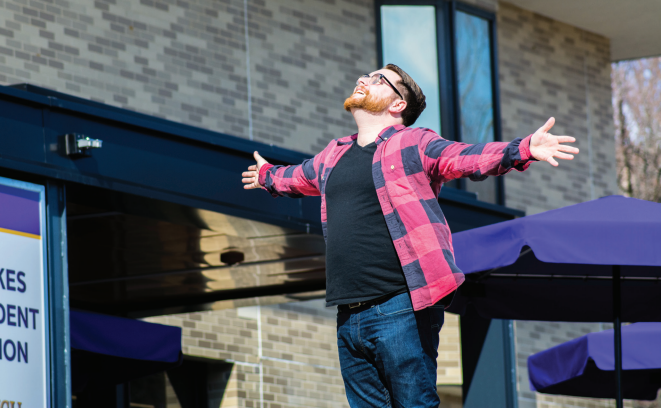As the fifth week of school is approaching, I bet you feel tired, stressed and anxious. Especially after the exciting win for the Philadelphia Eagles, I bet you pushed off some of your work so you were able to celebrate with the rest of the fans in town. Now, it is time to slowly come back to reality and get back on the homework grind.
Just like most of you reading this article, I also held off some work because I was too busy celebrating. It’s understandable behavior: Why wouldn’t we celebrate our city’s first Super Bowl victory?
After taking Yoga I through III, I learned how much breathing can help a person lower their blood pressure, relax and calm down. Around four years ago, I developed anxiety. Rather than take the medication route, I tried to seek other ways to help myself calm down.
Yes, working out, taking a walk, eating or simply hanging out with friends also helps; but what happens when you cannot take the time out of your day to complete one of those tasks to reduce stress?
This is where breathing techniques come into play. Whether you are in the library, in a classroom or in your room doing homework, breathing will always help.
All you have to do is shut your eyes and take a few deep breaths, then you will realize that everything will be all right. Breathing techniques are a powerful tool to ease stress and your mind. Deep breaths could last for however long you please; they could last for 30 seconds or 10 minutes.
Ever notice when you get the anxious feeling, you feel like you cannot breathe? Anxious feelings can result from short, shallow breaths in your chest. This means that you are not giving your lungs and stomach the proper air flow.
There are four quadrants that your deep breaths should hit in the body: the lungs, chest, lower stomach and lower back.
In order to fully relax the body, the best way to use breathing techniques is to get in a comfortable position, either sitting up or laying down. Keep one hand on your chest and one hand on your stomach to make sure you are getting the proper air flow in the four quadrants. As you inhale deeply, you should feel your belly rise. After one breath you may feel better, but try to take a minimum of three breaths to ensure the soothing feeling. Generally, you can take as many breaths as you want. Everybody is different, and only you know what it takes to help relieve your stress.
Deep breathing also has other health benefits. Aside from giving a person a relaxed state of mind, it can prevent sleep problems as well. To be able to fall asleep at night, the technique suggests that you take a longer exhalation than your inhale.
Studies show that if a person does a significantly longer exhale than the inhale, it will create a relaxed, tired feeling. On the other hand, a shorter exhale with a longer inhale will help create an alert and more energized feeling. Since deep breathing is a wonderful aid in sleep, you will wake up more energized and ready to take on the day.
As we grow older, we tend to hold unnatural positions and eventually our body will adapt to a new posture. In many cases, this negatively affects not only our spine alignment, but also our breathing patterns.
When a person is sitting hunched over, they tend to take shorter and more shallow breaths. Next time you sit down, make sure you have correct posture; it will not only help improve your overall posture, but you will naturally be able to take deeper breaths.
Another health benefit deep breathing provides is that it helps treat general body aches and pain by keeping the person calm. Deep breaths release endorphins throughout the body. Endorphins are natural pain killers created by our own bodies.
Deep breathing also stimulates blood flow. Triggering more blood flow helps bring more oxygen to your muscles and joints, which is the reason it helps relieve pain. A great example of deep breathing techniques are those that a woman going through labor pains uses. A common breathing technique these women use is a fast pattern of inhalation with a long exhalation, or vice versa to help ease their pain.
Next time you find yourself in a stressful situation, either sit back, stand still or lay down and take as many deep breaths as you need to help you finish out the task. As Bob Marley said, “Every little thing is going to be all right.”
Marie Bray is a fourth-year student majoring in communication studies. ✉ MB822035@wcupa.edu.

